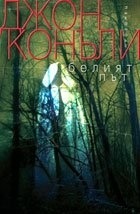You need to sign in or sign up before continuing.
Take a photo of a barcode or cover
The White Road, though, felt disappointing. It was a good read, and I enjoyed the experience of reading it, but the plot felt like it took too long to get going, and the conclusion felt anticlimactic. There were elements of the plot that came and went, and then returned without convincing me that it was an earned part of the story, and it was hard to tell which points were going to be important and which weren't. By the time we got to the big reveal at the end, I was struggling to remember who the main people were, and why they were important.
Also, Connolly appears to begin an overarching plot that will carry through the books, starting with the previous volume, but it's just barely a part of the book, and it ends rather suddenly. That part of the plot felt like it could have been an epilogue to the last book, for all the impact it had on the story. I would have felt differently if that subplot had been carried forward through other books, but it felt weird for it to be introduced and concluded all in the same book.
(It's entirely possible Connolly will prove me wrong in the next book. Maybe he IS planning to carry this out over multiple books in the series, and I'm missing the larger picture.)
I'll keep reading the series (see the first paragraph), but for as much as I liked The Killing Kind, The White Road was a major let-down.
Overall, the plot was interesting, as were the characters. There are so many different threads of story throughout this book. At times they seem to be a little tangled, but in the end they came together perfectly. Usually when a book has so much going on something gets left to the side and forgotten. However, in this book, everything comes together in an amazing aha kind of way.
*After going back and reading an earlier book in the series, I think that this one would be much easier to follow. It is definitely better to read this series in order!
And in Thomaston, the first link lay waiting to be uncovered.
The fourth novel in the series tells us a bit about our characters, who have done quite a few things since we last saw them in THE KILLING KIND: Charlie and Rachel have moved into a house together, while Angel and Louis are inflicting vigilante jousting upon racists while the former recovers from his physical and psychological injuries at the hands of Reverend Faulkner and his children in the last book. However, THE WHITE ROAD soon introduces a sinister and gruesome mystery for Charlie to solve when a young black man is set to be executed for the rape and subsequent murder of the daughter of a fairly powerful man. The black man’s lawyer asks for Charlie’s help, but Charlie—with fatherhood looming and another case keeping him busy—declines. However, when the lawyer is nearly killed in an arson attack due to his stance in the case related to the most powerful man in South Carolina’s daughter, Charlie reluctantly agrees to help. However, amidst Faulkner’s impending court trial, Charlie soon finds himself facing enemies that may not be entirely human...
When I look out on the Scarborough marsh from the windows of my house and see the channels cutting through grass, interlinking with one another, each subject to the same floods, the same cycles of the moon, yet each finding its own route to the sea, I understand something about the nature of this world, about the way in which seemingly disparate lives are inextricably inter-twined. At night, in the light of the full moon, the channels shine silver and white, thin roads feeding into the great glittering plain beyond, and I imagine myself upon them, walking on the white road, listening to voices that sound in the rushes as I am carried into the new world waiting.
THE WHITE ROAD expands on pieces of plot established in THE KILLING KIND: Faulkner serves as a primary antagonist (resulting in a great confrontation between him and Charlie within the first hundred pages); the theory of dark angels is added to; Angel is, as mentioned in the synopsis above, recovering from his wounds; and Charlie and Rachel are preparing for having a child. I like how they add a psychological horror element to the series as Charlie battles with the belief that he is being stalked by Faulkner’s dark angels.
The dark angel’s body was emaciated, its arms black mummified skin over slim bones, its face elongated and predatory, its eyes dark and knowing. It rested a clawed hand on the glass and its great wings, featherbed in darkness, beat a low cadence against the air. Slowly, it was joined by others, each silently taking up a position on the walls and the towers, until it seemed at last that the prison was black with them. They made no move toward me but I sensed their hostility, and something more: their sense of betrayal, as if I were somehow one of them and had turned my back upon them.
‘Ravens,’ said a voice to my side. It was an elderly woman. She carried a brown paper bag in her hand, filled with some small items for one of the inmates: a son, perhaps, or a husband among the old men in 7 Dorm. ‘Never seen so many before, or so big.’
And now they were ravens: two feet tall at least, the fingered wing tips clearly visible as they moved upon the walls, calling softly to one another.
‘I didn’t think they came together in those numbers,’ I said.
‘They don’t,’ she said. ‘Not normally, noho, but who’s to say what’s normal these days?’
We also get to learn more about Louis and Angel; their backstories are revealed to us in THE WHITE ROAD, revealing our two favourite homosexual criminals to be victims of circumstance who braved the cruelties and came out on top—and who are now stronger together. The story of Angel and Louis as actually pretty heartwarming, and isn’t too clichéd considering some of the gay/lesbian characters we have in literature, films and TV shows nowadays.
I did, however, have a few more problems with THE WHITE ROAD than I did with the previous books in the series. Nothing really seemed to be happening, and plot lines were introduced that went pretty much nowhere. One villain was introduced to us only to amount to pretty much nothing by the end. Speaking of the end: it seemed quite rushed after the main arc concluded, though the end of said main arc was admittedly pretty good. I know that THE WHITE ROAD is cherished among fans of this great, gory series, but to me the only thing making it not my least favourite would be how similar it is to the first book, with its unrelenting grit. The continuation from the last novel is also pretty interesting.
There are quite a few sad moments in THE WHITE ROAD, as there are with most of these books, as Charlie and those around him cope with loss and grappling with the idea of a close one’s death.
Case closed: isn’t that the phrase? It’s been so long, it seems, since you’ve had call to use it, to taste the falsity of the words even as they are forming on your tongue and passing through your lips. Case closed. Except it isn’t closed, for the absence continues to be felt in the lives of those left behind, in the hundred thousand tiny adjustments required to account for that absence, for the life, acknowledged or unacknowledged, that should be impacted on other lives. Irv Blythe, for all his faults, understood that. There is no closure. There are only lives continued or lives ended, with attendant consequences in each case. At least the living are no longer your concerned. It is the dead that stay with you.
And maybe you spread the photos and think: I remember.
I remember you.
I have not forgotten.
You will not be forgotten.
To conclude—or, if you want, to close this case—THE WHITE ROAD is a slightly disappointing yet highly entertaining novel that will please most fans of the Charlie Parker series.
Graphic: Adult/minor relationship, Alcoholism, Animal cruelty, Animal death, Body horror, Child abuse, Child death, Confinement, Cursing, Death, Domestic abuse, Drug abuse, Drug use, Emotional abuse, Gore, Gun violence, Infidelity, Mental illness, Misogyny, Pedophilia, Physical abuse, Racial slurs, Racism, Rape, Sexism, Sexual assault, Sexual content, Sexual violence, Slavery, Suicide, Torture, Toxic relationship, Violence, Blood, Antisemitism, Medical content, Kidnapping, Grief, Medical trauma, Stalking, Murder, Pregnancy, Fire/Fire injury, Abandonment, Alcohol, Sexual harassment, Colonisation, Injury/Injury detail
3.5 Stars for Narration by Paul Birchard (I couldn't get used to the NYC accent for Parker. Otherwise, he was great.)
4 Stars for Story
One of the elements I really enjoy about Connolly's writing is the way he seems to get the essence of the area he uses in the story. I don't feel like he was quite on the mark with Charleston, SC but there were a few parts that really did feel like the Low Country area. The casual remark about Hurricane Hugo and a small exchange Parker had with a local during his investigation. The part where the old man made Parker take a boiled peanut to prove Parker had the manners to take what was offered.
I really like the way the overall story arc develops within each book. It makes me want to read the next one because each tidbit is a satisfying lure for the next.
I was not as involved in the story as the previous books and it might be due to the change of narrator for the audiobook.
I identify Jeff Harding as THE voice of Charlie Parker , and the new narrator makes me confuse protagonists.





